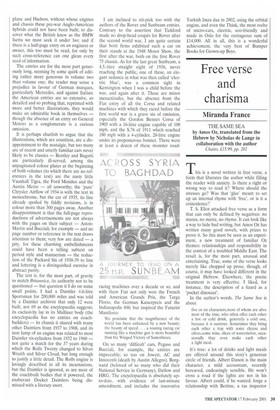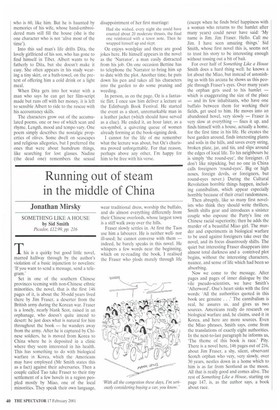Free verse and charisma
Miranda France
THE SAME SEA by Amos Oz, translated from the Hebrew by Nicholas de Lange in collaboration with the author Chatto, £15.99, pp. 201 This is a novel written in free verse, a form that liberates the author while filling the reader with anxiety. Is there a right or wrong way to read it? Where should the stresses go? Was that 'glee' meant to set up an internal rhyme with 'free', or is it a coincidence?
T. S. Eliot attacked free verse as a form that can only be defined by negatives: no stanza, no metre, no rhyme. It can look like a way to hide bad writing, but Amos Oz has written many good novels, with prizes to prove it. So this must be seen as an experiment, a new treatment of familiar Oz themes: relationships and responsibility in the context of a troubled Middle East. The result is, for the most part, unusual and entertaining. True, some of the verse looks merely like chopped up prose, though, of course, it may have looked different in the original Hebrew. Elsewhere, the poetic treatment is very effective. I liked, for instance, the description of a lizard as a 'pocket dinosaur'.
In the author's words, The Same Sea is about five or six characters, most of whom are alive most of the time, who often offer each other a hot or cold drink, generally a cold one, because it is summer. Sometimes they bring each other a tray with some cheese and olives, some wine, slices of watermelon, occasionally they even make each other a light meal.
It's true: a lot of drinks and light meals are offered around this story's generous circle of friends. Albert Danon is the main character, a mild accountant, recently bereaved, endearingly sensible. He won't cross a road if the lights are not in his favour. Albert could, if he wanted, forge a relationship with Bettine, a tax inspector who is 60, like him. But he is haunted by memories of his wife, whose hand-embroidered mats still fill the house (she is the one character who is not 'alive most of the time').
Into this sad man's life drifts Dita, the lovely girlfriend of his son, who has gone to find himself in Tibet. Albert wants to be fatherly to Dita, but she doesn't make it easy. She often appears in his study wearing a tiny skirt, or a bath-towel, on the pretext of offering him a cold drink or a light meal.
When Dita gets into hot water with a man who says he can get her film-script made but runs off with her money, it is left to sensible Albert to ride to the rescue with his accountancy skills.
The characters grow out of the accumulated poems, one or two of which scan and rhyme. Length, mood and tempo vary. One poem simply describes the nostalgic properties of olives, Some dwell on seascapes and religious allegories, but I preferred the ones that were about humdrum things, like searching for lost glasses. Nadine (the dead one) remembers the sexual disappointment of her first marriage:
Had she wished, every night she could have counted about 20 moderate thrusts, the final one reinforced with a tenor note. Then he wrapped himself up and slept.
Oz enjoys wordplay and there are good jokes here. He himself appears in the novel as the 'Narrator', a man easily distracted from his job. On one occasion Bettine has to telephone the Narrator to bring him up to date with the plot. Another time, he puts down his pen and takes all his characters into the garden to do some pruning and weeding.
In person, as on the page, Oz is a fantastic flirt. I once saw him deliver a lecture at the Edinburgh Book Festival. He started the event as a short, unremarkable man in a leather jacket (which should have served as a clue). He ended it, an hour later, as a sex-symbol, a quivering queue of women already forming at the book-signing desk.
I cannot for the life of me remember what the lecture was about, but Oz's charisma proved unforgettable. For that reason, perhaps above any other, I'm happy for him to be free with his verse.



































































 Previous page
Previous page